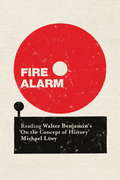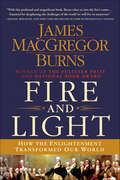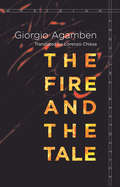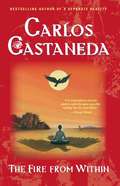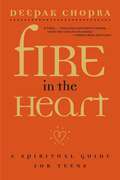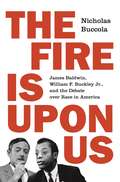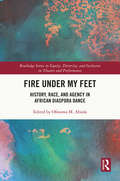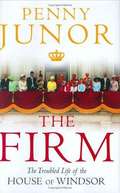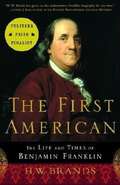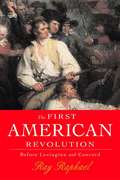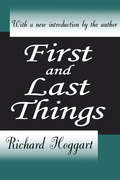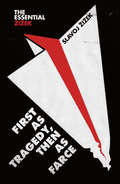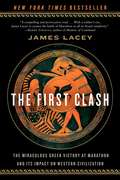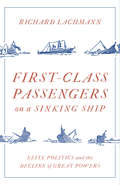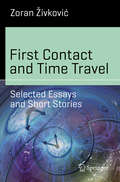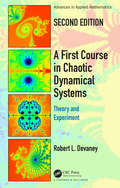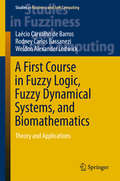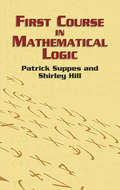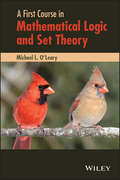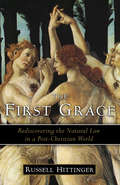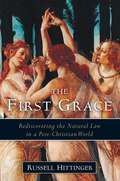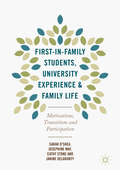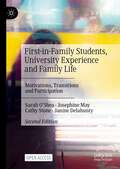- Table View
- List View
Fire Alarm: Reading Walter Benjamin's 'On the Concept of History'
by Michael Lowy Chris TurnerThis illuminating study of Benjamin's final essay helps unlock the mystery of this great philosopherRevolutionary critic of the philosophy of progress, nostalgic of the past yet dreaming of the future, romantic partisan of materialism -- Walter Benjamin is in every sense of the word an "unclassifiable" philosopher. His essay "On the Concept of History" was written in a state of urgency, as he attempted to escape the Gestapo in 1940, before finally committing suicide.In this scrupulous, clear and fascinating examination of this essay, Michael Löwy argues that it remains one of the most important philosophical and political writings of the twentieth century. Looking in detail at Benjamin's celebrated but often mysterious text, and restoring the philosophical, theological and political context, Löwy highlights the complex relationship between redemption and revolution in Benjamin's philosophy of history.From the Trade Paperback edition.
Fire and Light: How the Enlightenment Transformed Our World
by James MacGregor BurnsThe Pulitzer Prize–winning historian explores history’s most daring and transformational intellectual movement, the European and American Enlightenment.In this engaging, provocative history, James MacGregor Burns illuminates the two-hundred-year conflagration of the Enlightenment, when audacious questions and astonishing ideas tore across Europe and the New World. They transformed thought, overturned governments, and inspired visionary political experiments. Fire and Light brings to life the revolutionary leaders who, armed with a new sense of human possibility, created the modern world. Burns traces the origins of a distinctive American Enlightenment to men like Benjamin Franklin, John Adams, Thomas Jefferson, and James Madison, and their early encounters with incendiary European ideas about liberty and equality. It was these thinker-activists who framed the United States as a grand and continuing experiment in Enlightenment principles.Today the same principles have taken on new urgency around the world: in the turmoil of the Arab world, in the former Soviet Union, and in China, as well as in the United States itself. What should a nation be? What should citizens expect from their government? Who should lead, and how can leadership be made both effective and accountable? What is happiness, and what can the state contribute to it? Burns’s exploration of the ideals and arguments that formed the bedrock of our modern world shines a new light on these ever-important questions.Praise for Fire and Light“With this profound and magnificent book, Burns takes us into the fire’s center. . . . Essential for deciphering the challenges of the world we will live in tomorrow.” —Michael Beschloss, New York Times–bestselling author of Presidential Courage“James MacGregor Burns is a national treasure, and Fire and Light is the elegiac capstone to a career devoted to understanding the seminal ideas that made America—for better and for worse—what it is.” —Joseph J. Ellis, Pulitzer Prize and National Book Award–winning author of Revolutionary Summer“[A] captivating tale. . . . Briskly and beautifully told. . . . Superb.” —Publishers Weekly
The Fire and the Tale
by Giorgio Agamben Lorenzo ChiesaWhat is at stake in literature? Can we identify the fire that our stories have lost, but that they strive, at all costs, to rediscover? And what is the philosopher's stone that writers, with the passion of alchemists, struggle to forge in their word furnaces? For Giorgio Agamben, who suggests that the parable is the secret model of all narrative, every act of creation tenaciously resists creation, thereby giving each work its strength and grace. The ten essays brought together here cover works by figures ranging from Aristotle to Paul Klee and illustrate what urgently drives Agamben's current research. As is often the case with his writings, their especial focus is the mystery of literature, of reading and writing, and of language as a laboratory for conceiving an ethico-political perspective that places us beyond sovereign power.
The Fire From Within
by Carlos CastanedaFire from Within is the author's most brilliant thought-provoking and unusual book, one in which Castaneda, under the tutelage of don Juan and his "disciples," at last constructs, from the teachings of don Juan and his own experiences, a stunning portrait of the "sorcerer's world" that is crystal-clear and dizzying in its implications. Each of Carlos Castaneda's books is a brilliant and tantalizing burst of illumination into the depths of our deepest mysteries, like a sudden flash of light, like a burst of lightning over the desert at night, which shows us a world that is both alien and totally familiar -- the landscape of our dreams.
Fire in the Heart: A Spiritual Guide for Teens
by Deepak ChopraA fifteen-year-old boy is walking through a swirling fog on his way to school when a voice calls out, "Come here. We need to talk." Out of the mist emerges an old man with a white beard. He is a fantastic figure, as wizardly as Merlin, as wise as Socrates, as peaceful as Buddha. Whoever he is, the old man has appeared on that very day to change the boy's life. "You are old enough to learn about things," he says mysteriously. "And who is going to teach you but me?" The old man gives the boy four days of "soul training," a time of riddles, tricks, parables, and incredible twists that brings out surprising answers to each of four burning questions about spirituality: Do I have a soul? How do wishes come true? What is the supreme force in the universe? How can I change the world? "The old man with the white beard showed me the spiritual side of life," writes Deepak Chopra, "where real passion and excitement come from. So before you begin, take a deep breath. This story could turn out to be yours."
The Fire Is upon Us: James Baldwin, William F. Buckley Jr., and the Debate over Race in America
by Nicholas BuccolaHow the clash between the civil rights firebrand and the father of modern conservatism continues to illuminate America's racial divideOn February 18, 1965, an overflowing crowd packed the Cambridge Union in Cambridge, England, to witness a historic televised debate between James Baldwin, the leading literary voice of the civil rights movement, and William F. Buckley Jr., a fierce critic of the movement and America's most influential conservative intellectual. The topic was "the American dream is at the expense of the American Negro," and no one who has seen the debate can soon forget it. Nicholas Buccola's The Fire Is upon Us is the first book to tell the full story of the event, the radically different paths that led Baldwin and Buckley to it, the controversies that followed, and how the debate and the decades-long clash between the men continues to illuminate America's racial divide today.Born in New York City only fifteen months apart, the Harlem-raised Baldwin and the privileged Buckley could not have been more different, but they both rose to the height of American intellectual life during the civil rights movement. By the time they met in Cambridge, Buckley was determined to sound the alarm about a man he considered an "eloquent menace." For his part, Baldwin viewed Buckley as a deluded reactionary whose popularity revealed the sickness of the American soul. The stage was set for an epic confrontation that pitted Baldwin's call for a moral revolution in race relations against Buckley's unabashed elitism and implicit commitment to white supremacy.A remarkable story of race and the American dream, The Fire Is upon Us reveals the deep roots and lasting legacy of a conflict that continues to haunt our politics.
Fire Under My Feet: History, Race, and Agency in African Diaspora Dance (Routledge Series in Equity, Diversity, and Inclusion in Theatre and Performance)
by Ofosuwa M. AbiolaFire Under My Feet seeks to expose the diverse, significant, and often under-researched historical and developmental phenomena revealed by studies in the dance systems of the African Diaspora. In the book, written documentation and diverse methodologies are buttressed by the experiences of those whose lives are built around the practice of African diaspora dance. Replete with original perspectives, this book makes a significant contribution to dance and African diaspora scholarship simultaneously. Most important, it highlights the work of researchers from Ecuador, India, Puerto Rico, the United States, and the United Kingdom, and it exposes under-researched and omitted voices of the African diaspora dance world of the aforesaid locations and Puerto Rico, Columbia, and Trinidad as well. This study showcases a blend of scholars, dance practitioners, and interdisciplinarity, and engages the relationship between African diaspora dance and the fields of history, performance studies, critical race theory, religion, identity, and black agency.
The Firm: The Troubled Life of the House of Windsor
by Penny JunorHowever you look at it, the royal family is a big business, though one with more ups and downs than the stock market. Prince Philip calls it "The Firm," and all the royal executives and their powerful associates are supposed to make every effort to avoid even a hint of scandal that could diminish the reputation of the family business.
The First American: The Life and Times of Benjamin Franklin
by H. W. BrandsPULITZER PRIZE FINALIST • Benjamin Franklin, perhaps the pivotal figure in colonial and revolutionary America, comes vividly to life in this &“thorough biography of ... America&’s first Renaissance man&” (The Washington Post) by the two-time Pulitzer Prize finalist, bestselling historian, and author of Our First Civil War."The authoritative Franklin biography for our time.&” —Joseph J. Ellis, author of the Pulitzer Prize-winning Founding BrothersWit, diplomat, scientist, philosopher, businessman, inventor, and bon vivant, Benjamin Franklin's "life is one every American should know well, and it has not been told better than by Mr. Brands" (The Dallas Morning News). From penniless runaway to highly successful printer, from ardently loyal subject of Britain to architect of an alliance with France that ensured America&’s independence, Franklin went from obscurity to become one of the world&’s most admired figures, whose circle included the likes of Voltaire, Hume, Burke, and Kant.Drawing on previously unpublished letters and a host of other sources, acclaimed historian H. W. Brands has written a thoroughly engaging biography of the eighteenth-century genius. A much needed reminder of Franklin&’s greatness and humanity, The First American is a work of meticulous scholarship that provides a magnificent tour of a legendary historical figure, a vital era in American life, and the countless arenas in which the protean Franklin left his legacy.Look for H.W. Brands's other biographies: ANDREW JACKSON, THE MAN WHO SAVED THE UNION (Ulysses S. Grant), TRAITOR TO HIS CLASS (Franklin Roosevelt) and REAGAN.
The First American Revolution: Before Lexington and Concord
by Ray RaphaelThe famous Shot Heard Round the World in April 1775 was not the beginning of the armed struggle for independence, says popular historian Raphael. The British were at that point trying to regain the authority that thousands of artisans and farmers had seized from every Crown-appointed official in Massachusetts outside Boston the previous summer. Annotation c. Book News, Inc. , Portland, OR (booknews. com)
First and Last Things
by Richard HoggartPart meditation, part commonplace book, First and Last Things is an attempt by a writer of great distinction and strong convictions to take stock of his beliefs and values. Here, Richard Hoggart considers the big questions without shortchanging readers with easy answers. He examines problems (as he sees them) of faith; the mysterious origins of conscience; the importance of family and friends; the value of literature; the nature of memory; and the need, in old age, to find some value in existence. To these issues, and many others, the author brings a lifetime of rich experience and a mind well stocked with the best that has been written by those who have gone before. What emerges above all in this work is Richard Hoggart's love of, almost obsession with, quotations from great authors, especially, of course, Shakespeare. He muses on the business of capitalism and democracy, noting a reluctant conclusion that democracy is the least worst form of government, and that capitalism is its inevitable partner, but one which democratic societies should treat with "a very long spoon." He argues that market and consumer driven societies are inevitably led to relativism, head-counting, and populism. The result is a book that is introspective without being self-absorbed, that is thought-provoking but never preaching, that is, profound without being portentous. First and Last Things is a work that the young should read, if only to discover how much there is still to understand, and one that the old will treasure.
First As Tragedy, Then As Farce
by Slavoj ZizekBillions of dollars have been hastily poured into the global banking system in a frantic attempt at financial stabilization. So why has it not been possible to bring the same forces to bear in addressing world poverty and environmental crisis?In this take-no-prisoners analysis, Slavoj i ek frames the moral failures of the modern world in terms of the epoch-making events of the first decade of this century. What he finds is the old one-two punch of history: the jab of tragedy, the right hook of farce. In the attacks of 9/11 and the global credit crunch, liberalism dies twice: as a political doctrine and as an economic theory.First as Tragedy, Then as Farce is a call for the Left to reinvent itself in the light of our desperate historical situation. The time for liberal, moralistic blackmail is over.
The First Breath
by Icarus Phaethon"Everyone's life is a mountain. You can spend your whole time wandering around the lowlands and foothills of this great peak, but unless you make the commitment to get to the top one day, you will never find out who you really are." The First Breath is an astounding work that is a mix of travel narrative, philosophical dialogue, human drama, intrigue, love story and soul-searching personal journey. It will challenge your perception of the world and relationship with it. There's something terribly wrong with the world, at least Icarus thinks so. Something's not quite right and it's something he can't quite put his finger on. It's akin to that fleeting moment when you think of a rose then you actually see one, and can't quite figure out whether it's just a coincidence or something much stranger, deeper and far reaching than you could ever imagine.
The First Clash: The Miraculous Greek Victory at Marathon--and Its Impact on Western Civilization
by Jim LaceyMarathon--one of history's most pivotal battles. Its very name evokes images of almost superhuman courage, endurance, and fighting spirit. But until now, the story of what happened at Marathon has been told exclusively through the narrow viewpoint of specialists in antiquity. In this eye-opening new book, acclaimed journalist Jim Lacey, both a military historian and a combat veteran, takes a fresh look at Marathon and reveals why the battle happened, how it was fought, and whether, in fact, it saved Western civilization. Lacey brilliantly reconstructs the world of the fifth century B.C. leading up to the astonishing military defeat of the Persian Empire by the vastly undermanned but determined Greek defenders. Using the seminal work of Herodotus as his starting point, Lacey reconstructs the tactical and strategic scenario of the battle, including how many combatants each side might have used and who actually led the Greeks. He also disputes the long-repeated myths of Athenian inexperience and effete Persian arrogance. With the kind of vivid detail that characterizes the best modern war reportage, Lacey shows how the heavily armed Persian army was shocked, demoralized, and ultimately defeated by the relentless assault of the Athenian phalanx, which battered the Persian line in a series of brutal attacks. He reveals the fascinating aftermath of Marathon, how its fighters became the equivalent of our "Greatest Generation," and challenges the view of many historians that Marathon ultimately proved the Greek "Western way of war" to be the superior strategy for fighting--and winning--battles to the present day. Immediate, visceral, and full of new analyses that defy decades of conventional wisdom, The First Clash is a superb interpretation of a conflict that indeed made the world safe for Aristotle, Plato, and our own modern democracy. But it was also a battle whose legacy and lessons have often been misunderstood--perhaps, now more than ever, at our own peril.
First Class Passengers on a Sinking Ship: Elite Politics and the Decline of Great Powers
by Richard LachmannA history of why great powers decline, from Spain to the United StatesThe extent and irreversibility of US decline is becoming ever more obvious as America loses war after war and as one industry after another loses its technological edge. Lachmann explains why the United States will not be able to sustain its global dominance, and contrasts America's relatively brief period of hegemony with the Netherlands' similarly short primacy and Britain's far longer era of leadership.Decline in all those cases was not inevitable and did not respond to global capitalist cycles. Rather, decline is the product of elites' success in grabbing control over resources and governmental powers. Not only are ordinary people harmed, but also capitalists become increasingly unable to coordinate their interests and adopt policies and make investments necessary to counter economic and geopolitical competitors elsewhere in the world.Conflicts among elites and challenges by non-elites determine the timing and mold the contours of decline. Lachmann traces the transformation of US politics from an era of elite consensus to present-day paralysis combined with neoliberal plunder, explains the paradox of an American military with an unprecedented technological edge unable to subdue even the weakest enemies, and the consequences of finance's cannibalization of the US economy.
First Contact and Time Travel: Selected Essays and Short Stories (Science and Fiction)
by Zoran ŽivkovićThis volume collects both essays and fictional material around two core topics in the long career of the Serbian writer, essayist, researcher, publisher and translator. The first topic - first contact - is chiefly represented by his comprehensive essay on "The Theme of First Contact in the SF Works of Arthur C. Clarke" and reflected on the literary level with his short stories "The Bookshop" and "The Puzzle". Two shorter essays on the second topic - time travel in SF literature - introduce, amongst others, the well-known and fascinating mosaic novel Time Gifts, which skillfully explores the more literary side of the notions of past, present and future. In the annotations the author provides insights into his take on the subjects presented.
A First Course In Chaotic Dynamical Systems: Theory And Experiment
by Robert L. DevaneyA First Course in Chaotic Dynamical Systems: Theory and Experiment, Second Edition The long-anticipated revision of this well-liked textbook offers many new additions. In the twenty-five years since the original version of this book was published, much has happened in dynamical systems. Mandelbrot and Julia sets were barely ten years old when the first edition appeared, and most of the research involving these objects then centered around iterations of quadratic functions. This research has expanded to include all sorts of different types of functions, including higher-degree polynomials, rational maps, exponential and trigonometric functions, and many others. Several new sections in this edition are devoted to these topics. The area of dynamical systems covered in A First Course in Chaotic Dynamical Systems: Theory and Experiment, Second Edition is quite accessible to students and also offers a wide variety of interesting open questions for students at the undergraduate level to pursue. The only prerequisite for students is a one-year calculus course (no differential equations required); students will easily be exposed to many interesting areas of current research. This course can also serve as a bridge between the low-level, often non-rigorous calculus courses, and the more demanding higher-level mathematics courses. Features More extensive coverage of fractals, including objects like the Sierpinski carpet and othersthat appear as Julia sets in the later sections on complex dynamics, as well as an actualchaos "game." More detailed coverage of complex dynamical systems like the quadratic familyand the exponential maps. New sections on other complex dynamical systems like rational maps. A number of new and expanded computer experiments for students to perform. About the Author Robert L. Devaney is currently professor of mathematics at Boston University. He received his PhD from the University of California at Berkeley under the direction of Stephen Smale. He taught at Northwestern University and Tufts University before coming to Boston University in 1980. His main area of research is dynamical systems, primarily complex analytic dynamics, but also including more general ideas about chaotic dynamical systems. Lately, he has become intrigued with the incredibly rich topological aspects of dynamics, including such things as indecomposable continua, Sierpinski curves, and Cantor bouquets.
A First Course in Fuzzy Logic, Fuzzy Dynamical Systems, and Biomathematics: Theory and Applications (Studies in Fuzziness and Soft Computing #347)
by Laécio Carvalho de Barros Rodney Carlos Bassanezi Weldon Alexander LodwickThis book provides an essential introduction to the field of dynamical models. Starting from classical theories such as set theory and probability, it allows readers to draw near to the fuzzy case. On one hand, the book equips readers with a fundamental understanding of the theoretical underpinnings of fuzzy sets and fuzzy dynamical systems. On the other, it demonstrates how these theories are used to solve modeling problems in biomathematics, and presents existing derivatives and integrals applied to the context of fuzzy functions. Each of the major topics is accompanied by examples, worked-out exercises, and exercises to be completed. Moreover, many applications to real problems are presented. The book has been developed on the basis of the authors' lectures to university students and is accordingly primarily intended as a textbook for both upper-level undergraduates and graduates in applied mathematics, statistics, and engineering. It also offers a valuable resource for practitioners such as mathematical consultants and modelers, and for researchers alike, as it may provide both groups with new ideas and inspirations for projects in the fields of fuzzy logic and biomathematics.
First Course in Mathematical Logic (Dover Books on Mathematics)
by Patrick Suppes Shirley HillIn modern mathematics, both the theory of proof and the derivation of theorems from axioms bear an unquestioned importance. The necessary skills behind these methods, however, are frequently underdeveloped. This book counters that neglect with a rigorous introduction that is simple enough in presentation and context to permit relatively easy comprehension. It comprises the sentential theory of inference, inference with universal quantifiers, and applications of the theory of inference developed to the elementary theory of commutative groups. Throughout the book, the authors emphasize the pervasive and important problem of translating English sentences into logical or mathematical symbolism. Their clear and coherent style of writing ensures that this work may be used by students in a wide range of ages and abilities.
A First Course in Mathematical Logic and Set Theory
by Michael L. O'LearyA mathematical introduction to the theory and applications of logic and set theory with an emphasis on writing proofs Highlighting the applications and notations of basic mathematical concepts within the framework of logic and set theory, A First Course in Mathematical Logic and Set Theory introduces how logic is used to prepare and structure proofs and solve more complex problems. The book begins with propositional logic, including two-column proofs and truth table applications, followed by first-order logic, which provides the structure for writing mathematical proofs. Set theory is then introduced and serves as the basis for defining relations, functions, numbers, mathematical induction, ordinals, and cardinals. The book concludes with a primer on basic model theory with applications to abstract algebra. A First Course in Mathematical Logic and Set Theory also includes: Section exercises designed to show the interactions between topics and reinforce the presented ideas and concepts Numerous examples that illustrate theorems and employ basic concepts such as Euclid's lemma, the Fibonacci sequence, and unique factorization Coverage of important theorems including the well-ordering theorem, completeness theorem, compactness theorem, as well as the theorems of Löwenheim-Skolem, Burali-Forti, Hartogs, Cantor-Schröder-Bernstein, and König An excellent textbook for students studying the foundations of mathematics and mathematical proofs, A First Course in Mathematical Logic and Set Theory is also appropriate for readers preparing for careers in mathematics education or computer science. In addition, the book is ideal for introductory courses on mathematical logic and/or set theory and appropriate for upper-undergraduate transition courses with rigorous mathematical reasoning involving algebra, number theory, or analysis.
The First French Reformation
by Tyler LangeThe political culture of absolute monarchy that structured French society into the eighteenth century is generally believed to have emerged late in the sixteenth century. This new interpretation of the origins of French absolutism, however, connects the fifteenth-century conciliar reform movement in the Catholic Church to the practice of absolutism by demonstrating that the monarchy appropriated political models derived from canon law. Tyler Lange reveals how the reform of the Church offered a crucial motive and pretext for a definitive shift in the practice and conception of monarchy, and explains how this First French Reformation enabled Francis I and subsequent monarchs to use the Gallican Church as a useful deposit of funds and judicial power. In so doing, the book identifies the theoretical origins of later absolutism and the structural reasons for the failure of French Protestantism.
The First Grace: Rediscovering the Natural Law in a Post-Christian World
by Russell HittingerIn the book’s first section, Hittinger defines the natural law, considers its proper relationship to moral theology and the positive law, and explains how and when judges should be guided by natural law considerations. Then, in the book’s second section, he contends with a number of controversial legal and cultural issues from a natural law perspective. Among other things, he shows how the modern propensity to make all sorts of “rights claims” undermines the idea of limited government; how the liberal legal culture’s idea of privacy elevates the individual to the status of a sovereign; and how the Supreme Court has come to cast religion as a dangerous phenomenon from which children must be protected.Whether discussing the nature of liberalism, the constitutional and moral problems posed by judicial usurpation, or the dangers of technology, Hittinger convincingly demonstrates that in our post-Christian world it is more crucial than ever that we recover older, wiser notions of the concepts of freedom and law—since to oppose them is to misunderstand both profoundly.
The First Grace: Rediscovering the Natural Law in a Post-Christian World
by Russell HittingerThe last two decades or so have seen a marked resurgence of interest in natural law thought, a movement in which Russell Hittinger has been a major figure. The First Grace: Rediscovering the Natural Law in a Post-Christian World reveals the power and subtlety of Hittinger's philosophical work and cultural criticism. Whether discussing the nature of liberalism, the constitutional and moral problems posed by judicial usurpation, or the dangers of technology, Hittinger convincingly demonstrates that in our post-Christian world it is more crucial than ever that we recover older, wiser notions of the concepts of freedom and law - and that we see that to place these two concepts in opposition is to misunderstand both profoundly.
First-in-Family Students, University Experience and Family Life
by Sarah O'Shea Josephine May Cathy Stone Janine DelahuntyThis book examines the university experiences of first-in-family university students, and how these students' decisions to return to education impact upon their family members and significant others. While it is well known that parental educational background has a substantial impact on the educational levels of family and dependents, it is unclear how attending university as a first-in-family student translates into the family and community of the learner. With the continuing requirements for higher education institutions to increase the participation of students from a range of diverse backgrounds and educational biographies, this is a major gap in understanding that needs to be addressed. Exploring how this university participation is understood at an individual, familial and community level, this book provides valuable insights into how best to support different student requirements. This book will be of great interest to students and researchers in the fields of education and sociology, as well as policy-makers in education and diversity initiatives.
First-in-Family Students, University Experience and Family Life: Motivations, Transitions and Participation
by Sarah O'Shea Josephine May Cathy Stone Janine DelahuntyThis open access book, now in its second edition, offers a comprehensive overview of the experiences of First in Family (FiF) or first-generation students in higher education. It draws upon narratives of students and their family members and spans the entire university student life cycle (pre-entry, commencement, progression and graduation) with a focus on specific cohorts including mature-aged students, parents or carers, as well as the differentiated experiences of male and female learners. With research drawn from three major research projects and including over 650 FiF students from across all Australian states and territories, as well as Europe, this wealth of perspectives provides unique insights into the lived reality of attending university in contemporary higher education settings. The book is written for a broad audience and will appeal to those working in universities, as well as family members and students who may be contemplating participating in higher education.
